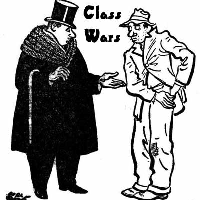3 California Cities Among Top 10 in U.S. with Most Income Inequality

California has some of the most economically successful cities in the country and they have, as a consequence of their good fortune, some of the greatest income inequality.
A recently-released study of the country’s 50 largest cities by Alan Berube at the Brookings Institution lists San Francisco (2), Oakland (7) and Los Angeles (9) among the Top 10 with gaping disparities. San Francisco showed the largest increase in income inequality, by far, between 2007 and 2012.
Berube measured inequality by using the “95/20 ratio.” The measurement is derived by first determining “the income at which a household earns more than 95 percent of all other households” and the “income at which a household earns more than only 20 percent of all other households.” The first number is divided by the second number and, voila, the unsurprising chasm between the haves and have-nots is revealed.
Atlanta has the highest ratio of inequality. Its average wealthiest 5% made 18.8 times as much as the average household in the bottom 20%. Atlanta was followed by San Francisco (16.6), Miami (15.7), Boston (15.3), Washington, D.C. (13.3), New York (13.2), Oakland (12.7), Chicago (12.5), Los Angeles (12.3) and Baltimore (12.2). The average ratio is 10.8.
As Berube points, “not all unequal cities [are] created equally.” For instance, San Francisco has high inequality because its rich are very rich, while Miami’s status is due to its poor being very poor.
Virginia Beach, Virginia, has the lowest income inequality among the 50 cities, with a ratio of 6.0. It earned its ranking on the strength of its lower 20% earning a 2012 household income of $31,051. That compares to the average of $18,137. No California cities made the Bottom 10.
The average household income of the top 5% in the 50 cities was $196,409. San Francisco’s was $353,576, compared to a household income of $21,313 among the lower class. Oakland’s disparity was $223,965-$17,646 and Los Angeles clocked in at $217,770-$17,657.
Income inequality in the United States is growing and big cities tend to have the greatest gap. The 95/20 ratio grew from 10.0 to 10.8 in the 50 largest cities between 2007 and 2012. San Francisco increased 3.9 points, followed by Atlanta (3.1), Miami (2.1), Sacramento (2.0), Jacksonville (2.0), Milwaukee (2.0), Indianapolis (1.7), Baltimore (1.6), Charlotte (1.6) and Tucson (1.5). Oakland experienced no change, as both rich and poor declined equally.
The growing gap in these 50 cities owes mostly to the declining income of the have-nots. Both rich and poor have declined since 2007, according to Berube, but the poor have dropped more precipitously. Income for the poor declined $2,435, from $18,137 in 2007, a 13.4% drop. The wealthy dropped $8,805 from $196,409, or 4.5%.
–Ken Broder
To Learn More:
San Francisco, Oakland Among the Cities with Greatest Income Inequality (by Eric Young, San Francisco Business Times)
San Francisco's Disparity Between Poor and Rich Near Top in the Nation, Study Shows (by Josh Boak, Associated Press)
Los Angeles Is Among the Top 10 U.S. Cities for Income Inequality (by Gale Holland, Los Angeles Times)
All Cities Are Not Created Unequal (by Alan Berube, Brookings Institution)
- Top Stories
- Controversies
- Where is the Money Going?
- California and the Nation
- Appointments and Resignations
- Unusual News
- Latest News
- California Forbids U.S. Immigration Agents from Pretending to be Police
- California Lawmakers Urged to Strip “Self-Dealing” Tax Board of Its Duties
- Big Oil’s Grip on California
- Santa Cruz Police See Homeland Security Betrayal in Use of Gang Roundup as Cover for Immigration Raid
- Oil Companies Face Deadline to Stop Polluting California Groundwater





